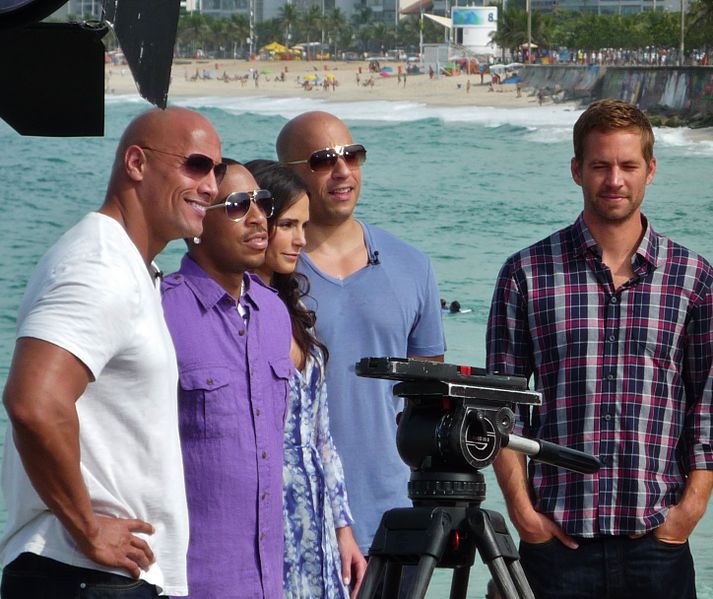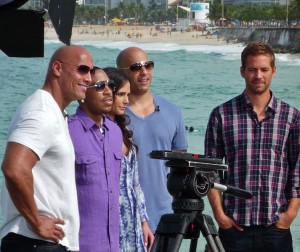Furious 7 Movie Review

It’s hard to believe that a 2001 street racing drama would evolve into Universal’s most successful franchise. That is exactly what “The Fast and the Furious” has become. This latest installment, “Furious 7,” will be remembered for one main caveat: star Paul Walker’s final film. Walker was tragically killed in a November 2013 motor accident, eerily similar to the series’ dealings.
Production was halted immediately, and after a few months, it was decided that the film would be finished, and dedicated to Walker’s memory. He is actually in the entire film for the most part. It is the final sequence that was reconfigured upon his death, using stand ins, voiceovers, and CGI (his brothers assisted). His sendoff is certainly the film’s strongest point. Now, on to the review as a whole.
Since “Fast Five,” each entry in the series has upped the ante in terms of insane, unbelievable action sequences. James Wan takes over from Justin Lin. He seems out of his range with this material. These last two entries have done more harm to the credibility of this series, in my opinion. Obviously, you enter any film with a suspension of disbelief. This franchise has always flirted greatly with that line. But now, it seems plot has been completely thrown away in favor of outlandish action sequences.
 Deckard Shaw (Jason Statham) seeks revenge for what Toretto’s (Diesel) crew did to his brother in the last film. He starts by killing Han. In the “Fast” continuity, this is the first movie to take place AFTER “Tokyo Drift.” All others came before it. Shaw visits agent Hobbs (the Rock), and the two engage in a straight brawl that should be commentated by Jim Ross and Jerry Lawler. Seriously, the Rock actually Rock Bottoms Statham, his old wrestling maneuver. After Hobbs survives an impeccable fall, he informs Toretto of the happenings, and here we go, one last ride.
Deckard Shaw (Jason Statham) seeks revenge for what Toretto’s (Diesel) crew did to his brother in the last film. He starts by killing Han. In the “Fast” continuity, this is the first movie to take place AFTER “Tokyo Drift.” All others came before it. Shaw visits agent Hobbs (the Rock), and the two engage in a straight brawl that should be commentated by Jim Ross and Jerry Lawler. Seriously, the Rock actually Rock Bottoms Statham, his old wrestling maneuver. After Hobbs survives an impeccable fall, he informs Toretto of the happenings, and here we go, one last ride.
Toretto visits Tokyo to reclaim Hans body. We get a quick cameo of Lucas Black with Vin Diesel. I was hoping they’d show the race from the end of “Tokyo Drift,” but they do not. Soon enough, newcomer Kurt Russell comes into play. He is apparently a friend of Hobbs, a secret agent with one goal in mind: find this hacking device called God’s eye. It is the ultimate hacking device that could cause catastrophe in the wrong hands. He pitches a deal to Toretto, which is, rescue the creator Ramsey, (Nathalie Emmanuel) from the villainous Jakande (Djimon Hounsou). If he does this, the government will allow him to use the device to track down Shaw, and aid in ridding him, before Shaw does the same.
Along the way, we are treated to absolutely absurd action sequences, simply implausible. It is not that this is a always a bad thing, in doses, but this film overdoes it. What starts as entertainment quickly becomes, “okay, how much more can I take of this?” More importantly, how much more can the characters take of this? All the actors have finally jumped on board with playing their parts as self aware, as in, they know just how obnoxious all of this is. Our heroes make their way around the world, while being hunted by Shaw. My friend John Scatchell put it perfectly: Shaw is like the Terminator. He shows up wherever the protagonists are, with zero explanation as to how he could possibly know their whereabouts. He just knows. He is an ex black ops agent, but come on.
All comes to a whole back in Los Angeles, where one final battle of insanity ensues. A citywide battle involving choppers, drones, and of course, juiced up cars, completely destroys the streets of LA (both literally and figuratively).
In the end, the true treat of this film is its farewell to Paul Walker’s character, Brian O Connor. There are a couple scenes with chilling moments and dialogue given what happened. But, one scene in particular I found riveting, was an emotional phone call between Walker and Brewster. They recollect over their beginnings, in a moment that connects the reality and fiction elements of the actors involved. I won’t spoil the ending. Just know this: It is pure gold, and so simple, yet so effective; and a great demonstration of the power of cinema. This heartfelt sequence alone makes the entire movie worth watching.
The “Fast” franchise will go on (though I don’t think it should). Given the way this installment ended, it just seems perfect to finally end it now that one of the leading catalysts is gone. The final scene is everlasting, and the end of an era.
2/4 stars.

Leave a Reply